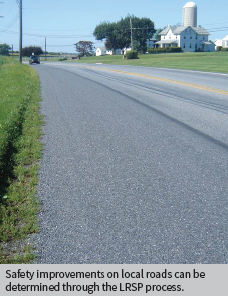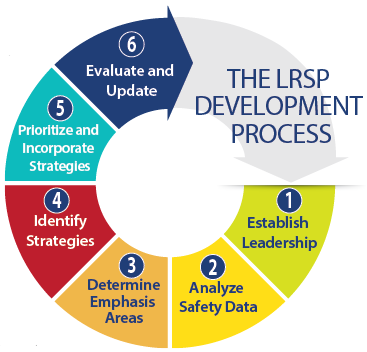U.S. Department of Transportation
Federal Highway Administration
1200 New Jersey Avenue, SE
Washington, DC 20590
202-366-4000
Printable Version [PDF,
343 KB]
(You may need the Adobe Reader to view the PDFs on this page.)
For more information about this Proven Safety Countermeasure, review the Office of Safety's Local and Rural Road Safety Briefing Sheets.

U.S. Department of Transportation
Federal Highway Administration
FHWA-SA-17-069
Local roads experience
3× the fatality rate
of the Interstate Highway System.
Source: FARS and FHWA Highway Statistics Series (2014)

Source: Delaware Valley Regional Planning Commission
A local road safety plan (LRSP) provides a framework for identifying, analyzing, and prioritizing roadway safety improvements on local roads. The LRSP development process and content are tailored to local issues and needs. The process results in a prioritized list of issues, risks, actions, and improvements that can be used to reduce fatalities and serious injuries on the local road network.

While local roads are less traveled than State highways, they have a much higher rate of fatal and serious injury crashes. Developing an LRSP is an effective strategy to improve local road safety for all road users and support the goals of a State's overall strategic highway safety plan.
Although the development process and resulting plan can vary depending on the local agency's needs, available resources, and targeted crash types, aspects common to LRSPs include:
Local road agencies should consider developing an LRSP to be used as a tool for reducing roadway fatalities, injuries, and crashes.1 The plan should be viewed as a living document that can be updated to reflect changing local needs and priorities.
1 Developing Safety Plans: A Manual for Local Rural Road Owners, FHWA-SA-12-017, provides guidance on developing an LRSP.
For more information on this and other FHWA Proven Safety Countermeasures, please visit
https://safety.fhwa.dot.gov/provencountermeasures.


